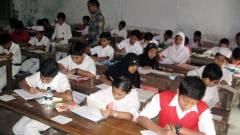A dismal new report from the World Bank suggests that the majority of fifth grade students in Bangladesh do not have the necessary academic competence typically expected at that level.
Sobering statistics suggest that even in the early years of primary education, the vast majority of children are failing to meet their minimum competency targets.
This clearly indicates that although Bangladesh has made vast strides in achieving near universal access to primary education, the quality of education needs to be improved as well .
At the root of the problem is that money is not being efficiently spent when it comes to education. Bangladesh’s budgetary allocation for the sector is also the lowest in the South Asian region, limiting the amount of funding available.
The problems which result include unimaginative and poorly delivered curricular, the hiring of poor quality teachers and inefficiently run and managed school administrations.
Fixing our primary education system should be the key challenge for the government. The education ministry must give more attention to improving the quality of primary education in order to ensure that everyone has a high quality educational foundation.
The unpalatable truth is that the unevenness of primary education is also an economic problem. Children from poor households are more likely to perform poorly academically than children from economically well-off households. It is an unacceptable cost to the nation to allow such discrepancies to continue.
Improving the quality of primary education is essential to overcome this for the benefit of the nation.
Source: Dhaka Tribune










